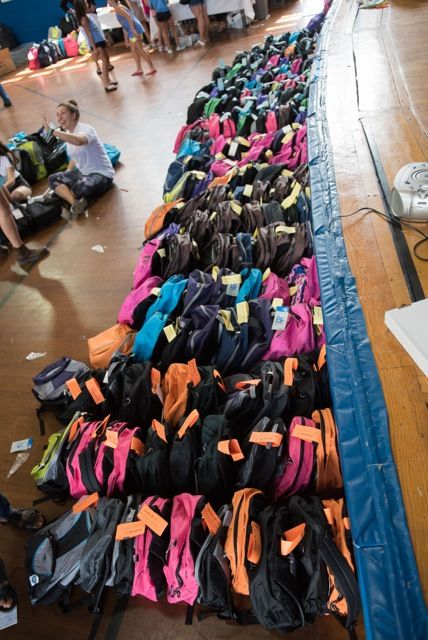More than 400 school-aged children and parents from local schools and synagogues filled the Solomon Schechter School in Williston Park on Aug. 19 to pack more than 10,000 backpacks for schoolchildren in need on Long Island.
The backpack assembly was one of seven backpack assemblies held by the United Jewish Appeal as part of its Supplies for Success program.
Mindy Richenstein, chair of the UJA’s Supplies for Success board, said this year’s event was the largest in its history.
“We know there’s a lot of neighbors in need and we wanted to be of service to them,” Richenstein said. “We think that education is so important and how are you going to learn if you don’t have the basic supplies?”
The backpacks will be distributed all across Long Island through UJA-Federation beneficiary agencies, schools and other local organizations, she said. These include shelters for those that are homeless or affected by domestic violence and school districts.
Richenstein said the backpacks will go to kids in need in places such as Great Neck, Wyandanch and Hempstead.
Lisa Sakhai, who brought her two daughters Jessica and Shayna along to help pack bags, said she got involved with the UJA to teach her children about community service.
“Every year I come, I encourage other people to come and be involved with UJA, especially with this event to give back,” Sakhai said. “It’s a great way to teach the kids about giving back, they can be hands on.”
The UJA raised more than $100,000 for the backpacks through fundraisers it holds throughout the year.
Richenstein said there were seven backpack assemblies on Long Island and more assemblies in New Jersey and Broward County, Fla.
She said poverty on Long Island is prevalent but easily ignored.
The poverty rate on Long Island has increased by 43 percent from 2007-13 according to the Long Island Index project.
In addition, the project found that more than 17 percent of individuals on Long Island were living below 200 percent of the federal poverty line, which would be an annual income of slightly below $24,000 a year.
“No family should have to be able to choose between food on the table and school supplies for their children,” Richenstein said. “We’re so happy that the community that the community can come together and make a difference.”



